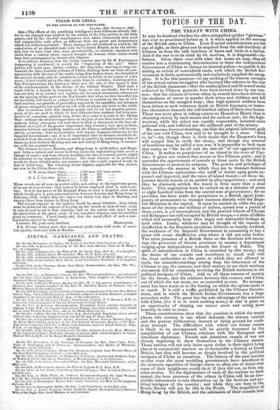STEAM FOR CHINA.
TO THE EDITOR OP THE SPECTATOR.
London, 29th November 1842.
Sm—Tbe effects of the gratifying intelligence from China are already visi- ble in the changed tone adopted by the writers of the City articles in the daily papers, and by the cheerful countenances with which commercial men meet and congratulate each other, so different from the gloom and despondency which has hitherto prevailed. These changes are not produced so much by the expectation of an extended trade with the Celestial Empire, as by the convic- tion that we have been able, most providentially, to extricate ourselves with credit from a contest where SUMER brought no honour, where defeat would have been accompanied by irretrievable disgrace.
It is evident, however, that the treaty entered into by Sir H. POTTINGER (supposing it confirmed) is merely the "beginning of the end." Other powers will insist upon similar treaties ; the ring-fence that has so long sur- rounded the three hundred millions of China, abutting them out from all com- munication with the rest of the world, being thus broken down, the downfall of the present dynasty may be considered certain to follow in the course of a few years: it has existed up to this time solely from its exclusive, isolating policy. Our Plenipotentiary has destroyed that; sod the date of this treaty is that of the commencement of the decline of the Chinese Empire. That such a result will be a benefit to humanity at large, no one can doubt ; but it is no leas our duty to so control and regulate our increased intercourse consequent OR the opening of the ports to the Northward, that when we have hereafter (as we inevitably will have) to compel the Chinese to conform to the law of civi- lized nations, our grounds of proceeding may not be the squabbles and intrigues of opium-smugglers, but such as we can without shame put forth to the world. Our intercourse with this singular people and its no less singular govern- ment, at the one port to which we have hitherto been confined, had been pro- ductive of numerous !panels long before they came to a crisis in the Opium 'War: without the strictest supervision on the part of our Government over its subjects, whose enterprise will lead them to Hoek in thousands to the four ad- ditional ones (all of far greater importance than Canton) now open to them, disputes between our Rushing traders and the Chinese authorities will be con- stoutly occurring ; their accumulation will require frequent references to the Imperial Government ; and it is of importance that its distance should be di- minished from the scene of action as much as possible, by maintaining a line of steam-packets between Bombay and our new colony of Hong-kong, in connex- ion with the overland mail.
The distance between Bombay and Hong-kong is 4,000 miles; and Singa- pore forms a natural and secure half-way house for replenishing coals, or for a change of vessel ; and from whence, hereafter, the line of commuLication might be extended to our Australian Colonies. The total distance to be performed would be about 100.000 miles per annum ; and the vessels required would be four of 1,000 tons. The following steam.frigates, applicable for this service, are now in the China Seas—viz.
H. M. steam-frigate Vixen 1.100 tons, 320 horse-power. • ... Driver 1.100 .. 320 ....
H. E. I. Co's ditto Acbar 1,150 .. 900 • • • • Menuton 1,150 .. 400 ....
These vessels are all new, in perfect order, and, owing to the opportune peace, of no use as men-of-war: they cannot be better employed than in such a ser- vice. It is in the power of Sir ROBERT PEEL to send a despatch next mail, which would give a post-communication between London and Hong-kong in February 1843, within fifty-five days—viz, thirty-two days to Bombay, and twenty-three from thence to Hong-kong.
The annual expense to the country would be about 100,0001.; from which must be deducted the expense of keeping up the vessels as men-of-war, ready in case of need to act in that capacity ; and on the contra side must be put the prevention of the great cause of war, unsettled disputes, and the facilities given to commerce. I need hardly add, that the moral effect of such a com- munication cannot be valued.
I remain, Sir, your most obedient, MERCATOR. P.S. Private letters state that numerous junks laden with coals, of excel- lent quality, were met with at Nankin.


























 Previous page
Previous page